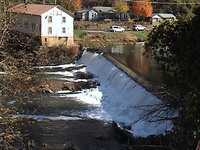
Dillsboro Dam Removal Approved
On Thursday, July 19th, the Federal Energy Regulatory Commission (FERC) released a decision that will allow the removal of Dillsboro Dam. The 12 foot tall and 310 foot long hydroelectric dam is located on the Tuckasegee River in Western North Carolina, and is a significant barrier to fish, mussels, and other aquatic organisms. It is also a barrier to paddlers, on an otherwise popular and accessible Class II river. With this nod of approval from FERC, dam removal could begin as early as this january, and should be completed within three years.
The removal of Dillsboro Dam is the result of over 3 years of collaborative studies and negotiations that addressed all of Duke Power's dams on the Tuckasegee and Nantahala rivers. These negotiations were part of a dam relicensing process that culminated in a settlement agreement which was signed in the fall of 2003. The removal of Dillsboro Dam is one key part of the comprehensive settlement agreement which also calls for enhanced dam releases on the Tuckasegee and Nantahala rivers, the creation of new river access sites, and significant riparian land conservation.
This decision comes over 1 year late. The requested new licenses for the other dams on the Tuckasegee and Nantahala (also late) have not yet been issued by FERC, however the Dillsboro decision is certainly a good sign that FERC is moving forward with their analysis of the settlement agreement and the other licenses. Earlier this year American Whitewater sent FERC a letter stressing the ecological and recreational impacts of their delay, highlighting an apparent miscommunication or standoff between FERC and a state agency that may have been the cause of the delay, and requesting prompt resolution of these issues and prompt action.
American Whitewater staff participated in the 3-year negotiations and significant post settlement efforts leading to this decision, and we fully support the decision to remove Dillsboro Dam. We worked closely with the Carolina Canoe Club, Duke Power, other environmental groups, and many other stakeholders in reaching the Settlement and are excited to see it being implemented.
The dam removal will:
- - Restore upstream access to roughly 10 miles of the Tuckasegee for fish and mussels
- - Restore roughly 4000 feet of lakebed to riverine habitat
- - Restore critical habitat for the endangered Appalachian Elktoe Mussel
- - Provide recreational passage for boaters
- - Result in a new park with river access in the Town of Dillsboro
- - Expose bedrock shelves that may form small rapids.
American Whitewater has seen countless examples where healthy rivers, healthy communities, and healthy economies go hand in hand. The removal of Dillsboro Dam is good for the river and good for the citizens of Western North Carolina – especially when considered in the context of the landmark settlement agreement that will create public benefits throughout the watershed. Implementing the settlement agreement will protect the quality of life - and way of life - of Western North Carolinians through enhanced public access to healthy rivers for fishing, swimming, hiking, and boating.
American Whitewater would like to thank the many individuals and organizations that worked tirelessly to make this landmark dam removal possible. We would also specifically like to thank our members and several foundations that made our involvement possible. These include the Conservation Alliance, Keen, Mott, Patagonia, and the Z. Smith Reynolds foundations.
